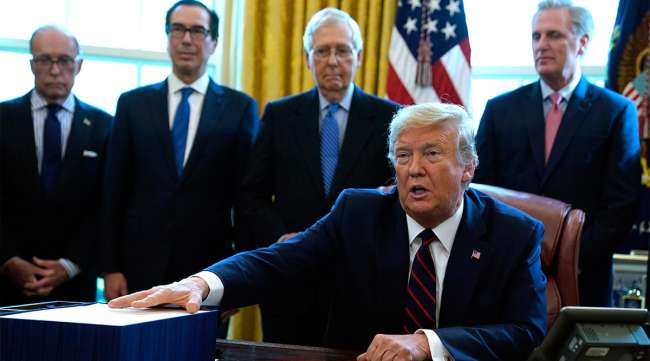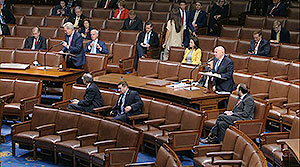Trump Signs $2.2 Trillion Stimulus After Swift Congressional Votes

[Stay on top of transportation news: Get TTNews in your inbox.]
WASHINGTON — President Donald Trump signed an unprecedented $2.2 trillion economic rescue package into law March 27, after swift and near-unanimous action by Congress that will support businesses, rush resources to overburdened health care providers and help struggling families during the deepening coronavirus epidemic.
Acting with unity and resolve unseen since the 9/11 attacks, Washington moved urgently to stem an economic free fall caused by widespread restrictions meant to slow the spread of the virus that have shuttered schools, closed businesses and brought American life in many places to a virtual standstill.
“This will deliver urgently needed relief,” Trump said as he signed the bill in the Oval Office, flanked only by Republican lawmakers. He thanked members of both parties for putting Americans “first.”

Rep. Thomas Massie in 2019 by J. Scott Applewhite/Associated Press
Earlier in the day, the House gave near-unanimous approval by voice vote after an impassioned session conducted along the social distancing guidelines imposed by the crisis. Many lawmakers sped to Washington to participate — their numbers swollen after a maverick Republican Thomas Massie of Kentucky signaled he’d try to force a roll call vote — though dozens of others remained safely in their home districts.
The Senate passed the bill unanimously late March 25, 96-0.
“Today we’ve all acknowledged our nation faces an economic and health emergency of historic proportions,” said House Speaker Nancy Pelosi (D-Calif). She said Americans deserve a full-on government response “to address these threats to their lives and their livelihood and they need it now.”
The $2.2 trillion legislation will speed government payments of $1,200 to most Americans and increase jobless benefits for millions of people thrown out of work. Businesses big and small will get loans, grants and tax breaks. It will send unprecedented billions to states and local governments, and the nation’s all but overwhelmed health care system.
“This is not a time for cynicism or invective or second-guessing,” said GOP Whip Liz Cheney of Wyoming. “This is a time to remember that we are citizens of the greatest nation on Earth, that we have overcome every challenge we have faced, and we will overcome this one.”
Among the organizations praising the passage of the bill was American Trucking Associations. The legislation provides critical assistance to motor carriers needed to maintain payrolls, the economy’s supply lines and the movement of essential goods.
“Across the country right now, truckers are answering the call during this national emergency, delivering food, medicine, PPE and other critical supplies,” said ATA President Chris Spear. “It’s important for our nation’s supply chain that trucking has access to liquidity, so we can keep our trucks on the road—and not on the sales lot.
“Truckers don’t have the option to telework, and they’re not asking for a handout. But they are asking for liquidity and the necessary bridge to keep trucks moving as America recovers from this crisis,” Spear said.
Despite reservations, arch conservatives joined with progressives like Alexandria Ocasio-Cortez (D-N.Y.) to back the bill, which moved quickly through a Congress that’s been battered by partisanship and is itself not immune to the suffering the virus has caused. Reps. Joe Cunningham (D-S.C.) and Mike Kelly (R-Pa.) announced March 27 that they’d tested positive, bringing the number of infected lawmakers to five.
Tea party Republicans said government orders to shutter businesses merited actions that conflict with their small-government ideology. Liberals accepted generous corporate rescues that accompany larger unemployment benefits, deferrals of student loans, and an enormous surge of funding for health care and other agencies responding to the crisis.
“I’m going to have to vote for something that has things in it that break my heart,” said conservative Rep. David Schweikert (R-Ariz.)

Rep. Kevin McCarthy (left) and Rep. Kevin Brady stand as they speak on the floor of the House on March 27. (House Television via AP)
Many lawmakers summoned the bipartisan spirit of 9/11 and efforts to fight terrorism. Others praised the roles low-income workers play in keeping the country going and the heroism of health care workers. Some, like Iowa Democrat Abby Finkenauer, who had just learned of two additional coronavirus-related deaths in her district, came close to tears.
Others couldn’t restrain their partisan impulses. Republicans chided Democratic leaders for delays and provisions they see as extraneous, such as funding for public broadcasting and the arts; Democrats said too many elements are a bailout for corporations that may not need it.
Still, in a chamber increasingly populated by lawmakers whose chief skill often seems to be partisan attacks, this day’s debate was a noteworthy break.
“We have no time to dither,” said Rep. Gerald Connolly (D-Va.) “We have no time to engage in ideological or petty partisan fights. Our country needs us as one.”
The House promptly adjourned for a weeks-long recess but will return later in the spring to consider further legislation.
Want more news? Listen to today's daily briefing:




